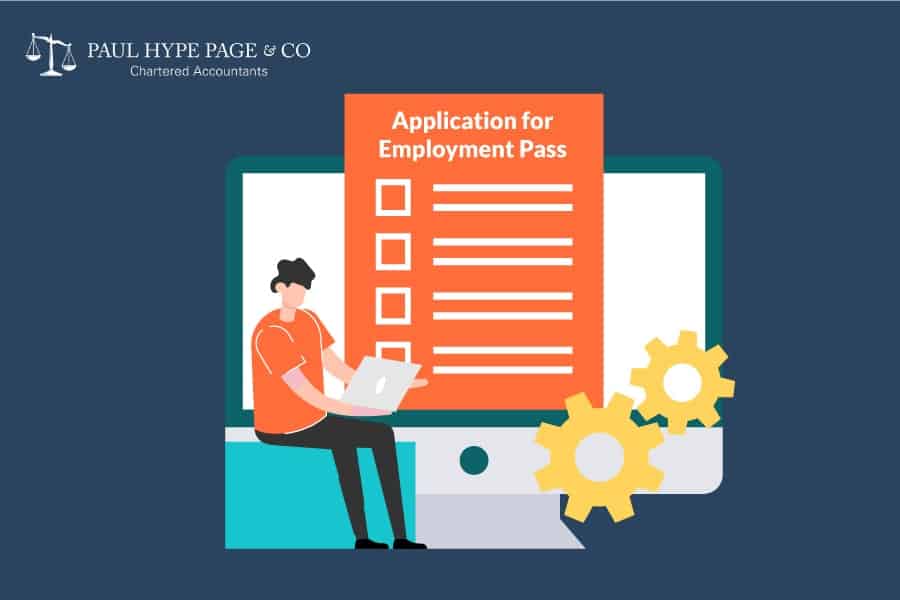Outline
- What is an S Pass and Employment Pass (EP)?
- Why Understanding the Difference Matters
- Key Differences Between EP and S Pass
- Who Can Apply for EP and S Pass?
- Validity Duration and Renewal
- Required Documents for Application
- Checking the Status of Your EP and S Pass
- Difference Between an Employment Pass (EP) and an S Pass in Singapore
- Family Sponsorship and Dependency Privileges
- Renewal and Long-Term Considerations
- Checking Application Status and Processing Times
- Best Practices for Employers
- Conclusion
As a business owner or employer in Singapore, expanding your team and hiring foreign talent can significantly enhance your operations and access to specialized skills. However, before beginning the hiring process, it is crucial to understand the differences between the Singapore Employment Pass (EP) and S Pass, both of which are issued by the Ministry of Manpower (MOM). These work visas serve as legal permits for foreign professionals to work under a Singapore-registered company.
What is an S Pass and Employment Pass (EP)?
The S Pass and Employment Pass (EP) are work permits tailored for foreign professionals in Singapore, designed to cater to different skill levels. Understanding the distinction between these passes ensures compliance with MOM regulations and helps businesses make informed hiring decisions.
- S Pass: Intended for mid-level skilled professionals, managers, executives, and technicians (PMETs) with relevant qualifications and industry experience. S Pass is suitable for technical roles, skilled jobs, and positions requiring diploma-level education or specialized certifications.
- Employment Pass (EP): Designed for highly skilled PMETs, typically holding a university degree or possessing significant experience in a specialized field. EPs are targeted at professionals in senior, managerial, or specialist roles, often earning higher salaries than S Pass holders.
Although both passes allow foreign PMETs to work legally in Singapore, they differ in eligibility, salary thresholds, quotas, and validity periods. Knowing these distinctions helps determine which pass best aligns with your company’s workforce needs.
Why Understanding the Difference Matters
Hiring foreign professionals is not just a legal obligation—it is also a strategic business decision. Foreign employees often bring expertise unavailable locally, fostering innovation and competitive advantage. Businesses in high-demand sectors such as technology, finance, engineering, logistics, healthcare, and advanced manufacturing often rely on international talent to stay competitive.
Understanding the key distinctions between EP and S Pass ensures your business complies with Singapore’s employment laws while optimizing recruitment outcomes. Proper planning prevents administrative delays and strengthens your company’s hiring process.
Key Differences Between EP and S Pass
1. Targeted Skill Levels
- S Pass: Mid-level skilled PMETs including technical staff, supervisors, and junior executives. Relevant diplomas or certifications are required.
- EP: High-level skilled PMETs, usually with university degrees or significant experience in specialized fields. Applicable across industries such as finance, technology, healthcare, and engineering.
2. Eligibility Criteria
| Criteria | S Pass | Employment Pass (EP) |
| Minimum Salary | SGD 3,150 (higher for older candidates or finance sector) | SGD 5,000 (SGD 5,500 for finance sector; must also pass COMPASS points from 1 Sep 2023) |
| Education / Experience | Diploma or technical certification; relevant experience | University degree or extensive relevant work experience |
| Skills & Experience | Technical competency verified against job requirements | Specialized professional or managerial competency verified by MOM |
| Quota & Levy | Subject to sector-specific quota and monthly levy | No quota or levy required |
| Validity | Up to 2 years, renewable for up to 3 years | Up to 2 years, renewable for up to 3 years |
| Dependency Privileges | Must earn ≥ SGD 6,000 to sponsor Dependant Pass | EP ≥ SGD 6,000 for DP; ≥ SGD 12,000 for Long-Term Visit Pass (parents) |
| Sector Restrictions | Manufacturing, construction, services, marine shipyards | Open to all sectors |
| Job Advertising (FCF Requirement) | Not required | Must advertise job on MyCareersFuture for ≥ 14 days (for companies with 10+ employees) |
Who Can Apply for EP and S Pass?
S Pass
Any registered Singapore company can apply for S Pass on behalf of a foreign employee, provided the employee meets eligibility criteria. Employers must register an S Pass account with MOM and submit all required documents for assessment.
Employment Pass (EP)
Employers must be registered companies in Singapore. They are also required to advertise the job on MyCareersFuture.sg for at least 28 days to show efforts to hire locally. Only after this can the EP application be submitted.
Both passes allow employers to hire foreign talent legally while ensuring compliance with MOM regulations.
Validity Duration and Renewal
- S Pass: Initial validity up to 2 years; renewable up to 3 years. Renewal depends on continued compliance with quotas, levies, salary, and job relevance.
- EP: Initial validity up to 2 years; renewable up to 3 years. Renewal under COMPASS framework requires meeting the points-based assessment, including salary and job relevance.
Both passes permit family sponsorship under certain conditions. S Pass holders earning ≥ SGD 6,000 can sponsor dependants, while EP holders at the same threshold can apply for Dependant Passes. EP holders earning ≥ SGD 12,000 may also sponsor Long-Term Visit Passes for parents.
Required Documents for Application
Accurate documentation ensures smooth processing and higher approval chances. Key documents include:
- Completed application form (accurately filled)
- Passport biodata page
- Educational certificates (relevant to the role, verified)
- Employment contract/offer letter
- Detailed CV or resume
- Company ACRA profile
- Latest financial statements (for new or small companies)
For EP applications, salary thresholds are crucial: minimum SGD 5,000 (SGD 5,500 for finance). Higher salaries may increase COMPASS points for EP approval.
Foreign qualifications must be translated into English and authenticated if necessary. Submitting complete and verifiable documents improves approval rates and reduces processing delays.
Checking the Status of Your EP and S Pass
Employers or agents can track application status via MOM’s online portal using either:
- FIN (Foreign Identification Number) or
- Passport number and application reference number
Statuses may include:
- Pending – still processing
- Approved – next steps provided
- Rejected – review reasons and reapply
- Additional documents required – further action needed
Processing Time
- S Pass: Approx. 3 weeks
- EP: Approx. 10 business days
Delays may occur for additional verification, such as foreign degree checks. If delayed:
- Contact MOM via their portal
- Ensure employer/agent has responded to document requests
Difference Between an Employment Pass (EP) and an S Pass in Singapore
Quotas, Levies, and Sectoral Considerations
One of the most significant differences between S Pass and EP relates to quotas and levies, which affect employer planning and workforce management.
S Pass
- Subject to quota restrictions, which vary by industry sector. For example, manufacturing, construction, marine, and services sectors have specific foreign worker limits based on company size and total workforce.
- Employers must also pay a monthly levy for each S Pass holder. Levy rates differ according to company size and sector.
- These requirements ensure a balance between local workforce opportunities and foreign talent integration.
Employment Pass (EP)
- No quotas or levies are imposed on EP holders, giving businesses greater flexibility in hiring highly skilled professionals.
- EP holders are generally targeted for senior, managerial, or specialist roles across all sectors, including finance, technology, healthcare, logistics, and R&D.
Sector-Specific Hiring
- S Pass is commonly used in mid-skilled sectors like manufacturing, marine shipyards, construction, and technical services.
- EP holders can work in all sectors with no restrictions, making them suitable for knowledge-intensive or managerial roles.
By understanding quota limits and levy obligations, companies can optimize their workforce planning and avoid penalties. Employers hiring S Pass holders must monitor quotas regularly to maintain compliance with MOM’s rules.
Family Sponsorship and Dependency Privileges
Both EP and S Pass holders can sponsor family members, but thresholds differ.
S Pass
- Monthly salary of ≥ SGD 6,000 required to sponsor Dependant Pass (DP) for spouse and unmarried children below 21.
- S Pass holders cannot sponsor parents or other extended family members.
EP
- Monthly salary of ≥ SGD 6,000 allows EP holders to sponsor spouses and children for Dependant Passes.
- EP holders earning ≥ SGD 12,000 per month can also sponsor Long-Term Visit Passes (LTVP) for parents.
- This enables EP holders to relocate their family to Singapore, supporting stability and work-life balance.
Additional Notes:
- Dependant Pass holders themselves cannot automatically work in Singapore. From May 2021 onwards, they must apply for an Employment Pass, S Pass, or Work Permit to legally work.
- Letters of Consent (LOC) are only available for specific business-related cases, such as DP holders owning or managing a registered company with 30% ownership and employing at least one Singaporean or PR earning ≥ SGD 1,400.
Renewal and Long-Term Considerations
Both S Pass and EP holders must renew their passes before expiry to maintain legal employment status in Singapore.
S Pass Renewal
- Renewals are subject to salary, qualifications, and job relevance.
- Employers must ensure compliance with quota and levy requirements.
- Typically renewed for up to 3 years at a time.
EP Renewal
- Renewals involve COMPASS scoring, which evaluates salary, qualifications, experience, and job relevance.
- EP holders must continue to meet eligibility criteria and report any significant job changes to MOM.
- Like S Pass, EP renewals are valid for up to 3 years.
Long-Term Implications:
- Both passes provide pathways to Permanent Residency (PR) under the Professional, Technical Personnel & Skilled Workers (PTS) scheme.
- EP holders, especially in high-paying or specialized roles, generally have a higher likelihood of approval due to MOM’s points-based evaluation.
Checking Application Status and Processing Times
Employers and applicants can track the status of both S Pass and EP applications through MOM’s online portal:
Steps:
- Visit MOM’s Check Work Pass Status page.
- Enter either:
- FIN (Foreign Identification Number)
- Passport number and application reference number
Possible Status Updates:
- Pending: Application is under review.
- Approved: Pass has been granted; next steps provided.
- Rejected: Application unsuccessful; review reasons and reapply if necessary.
- Additional Documents Required: MOM requests further documentation before processing.
Processing Times:
- S Pass: Approximately 3 weeks.
- EP: Around 10 business days.
- Applications requiring qualification verification or additional checks may take longer.
Employers should proactively respond to MOM requests to avoid delays and ensure the foreign professional can start working on schedule.
Best Practices for Employers
- Plan Early: Initiate the application well before the intended employment start date.
- Document Accuracy: Ensure all documents—passports, educational certificates, contracts—are accurate, translated into English (if required), and authenticated.
- Quota Management: For S Pass holders, monitor quota usage to maintain compliance with MOM regulations.
- Salary Compliance: Ensure salaries meet minimum thresholds; for EP, consider COMPASS scoring to strengthen approval chances.
- Family Considerations: Evaluate dependant and LTVP eligibility for long-term relocation planning.
- Seek Expert Advice: Engaging professional agencies can minimize errors, avoid rejections, and streamline processing.
Conclusion
Navigating the differences between the Employment Pass (EP) and S Pass in Singapore is essential for businesses hiring foreign talent. While both passes allow professionals to work legally, they cater to different skill levels, salary thresholds, quotas, and sector restrictions.
S Pass is ideal for mid-skilled professionals in technical and supervisory roles, subject to quota and levy regulations. EP is designed for highly skilled professionals, offering broader sectoral access, no quota restrictions, and greater family sponsorship privileges. Understanding eligibility criteria, documentation requirements, renewal processes, and dependency rules ensures smooth hiring and compliance with MOM regulations.
Employers who plan strategically, maintain accurate documentation, and stay updated on policy changes can maximize their workforce potential while offering foreign employees a stable pathway in Singapore. This understanding not only strengthens hiring outcomes but also supports Singapore’s reputation as a business-friendly hub attracting global talent.
Share This Story, Choose Your Platform!
Related Business Articles





